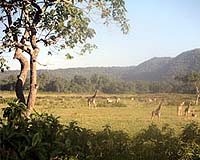| . |  |
. |
Juba, Sudan (UPI) Sep 16, 2010 A move by Kenya to build a deep-water port at Lamu on its Indian Ocean coastline could be the salvation of an oil-rich independent state in southern Sudan that is widely expected to emerge from a January referendum. Running an oil export pipeline from Sudanese oil fields, which are largely in the south, to Lamu would cut out the hated enemy of the southern Christians and animists, the northern Arab Muslim regime in Khartoum. President Omar Bashir, a former army general who seized power in Khartoum in 1989, won't easily surrender the southern oil fields, many of which lie along the so-far undefined border between north and south. Delineating a border and having the 2011 referendum on southern independence were key elements in the U.S.-brokered Comprehensive Peace Agreement that ended a 21-year civil war between Khartoum and the Sudan People's Liberation Army in the south. Under the 2005 peace agreement, the SPLA's political arm, the Sudan People's Liberation Movement, has governed the semi-autonomous south since the civil war ended. Juba is its capital. Sudan began producing oil in 1999, amid heavy fighting in the civil war, which was Africa's longest running conflict. Under the 2005 CPA, the oil revenues were shared between north and south. There are some fields in the north. But the International Crisis Group, a Brussels conflict resolution organization, and independent experts say that these are nearly depleted now, severely limiting Bashir's options in dealing with the south. One of the key oil zones is in the disputed Abyei region. In July 2009, the Permanent Court of Arbitration in The Hague awarded several major oilfields there to the northern government, redrawing Abyei's borders. Abyei, because it straddles the north-south boundary will have a separate referendum in January, conducted concurrently with the national poll, to determine its future status. The region is expected to vote overwhelmingly to join the south. But recent violence in Abyei, which broke out in late 2008 and led to the international arbitration, provides a clue to what could happen after the January voting. Abyei town was virtually razed in heavy clashes between rival tribes, the Ngok Dinka, who have controlled the town since the CPA, and the Misseriya, who back the north. Sudan produces around 480,000 barrels of oil per day. That's miniscule compared to Saudi Arabia's 10 million bpd but it's been enough to roughly double Sudan's per capita income over the last decade. The only export outlet is through a 1,000-mile pipeline that runs from the southern fields to Port Sudan, the country's main port on the Red Sea. Khartoum can cut off the flow of southern crude any time it wants, leaving the south at its mercy. The southerners have to find an alternative export route if they are to be able to sell their crude, the economic mainstay of their putative state. The proposed 1,000-mile pipeline to Lamu could solve that problem, although that infrastructure isn't likely to be in place for several years. What happens in the meantime isn't clear. But the south currently provides more than 80 percent of Sudan's oil production and Bashir cannot afford to relinquish his grip on the producing zones. "Should the south vote for separation, Khartoum will not sit back and allow Juba to simply take all the oil money with it," the Texas global security consultancy Stratfor noted in an analysis. "A vote for secession could therefore either lead to war or to a revenue-sharing arrangement very similar to the one that exists under the CPA. "An independent Juba would prefer the latter, of course, but its long-term interests would be best served with the third option: a pipeline from Southern Sudan to Kenya." On Monday, Kenya's Transport Ministry opened bidding for constructing the port in Lamu as well as the pipeline from Sudan. An oil refinery at Lamu is also in the cards. This is seen as part of new transport network that would also extend to Ethiopia at an estimated cost of $16 billion, with a construction phase of 3-5 years. In March, Toyota Tsusho Corp. of Japan approached the SPLM with an offer to build a $1.5 billion pipeline from Juba to Mombasa, Kenya's main port. Japan is the second ranking importer of Sudanese oil after China.
Share This Article With Planet Earth
Related Links Africa News - Resources, Health, Food
 Termites Foretell Climate Change In Africa's Savannas
Termites Foretell Climate Change In Africa's SavannasPalo Alto CA (SPX) Sep 10, 2010 Using sophisticated airborne imaging and structural analysis, scientists at the Carnegie Institution's Department of Global Ecology mapped more than 40,000 termite mounds over 192 square miles in the African savanna. They found that their size and distribution is linked to vegetation and landscape patterns associated with annual rainfall. The results reveal how the savanna terrain has evol ... read more |
|
| The content herein, unless otherwise known to be public domain, are Copyright 1995-2010 - SpaceDaily. AFP and UPI Wire Stories are copyright Agence France-Presse and United Press International. ESA Portal Reports are copyright European Space Agency. All NASA sourced material is public domain. Additional copyrights may apply in whole or part to other bona fide parties. Advertising does not imply endorsement,agreement or approval of any opinions, statements or information provided by SpaceDaily on any Web page published or hosted by SpaceDaily. Privacy Statement |